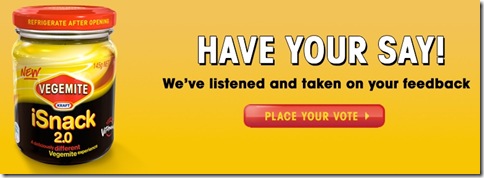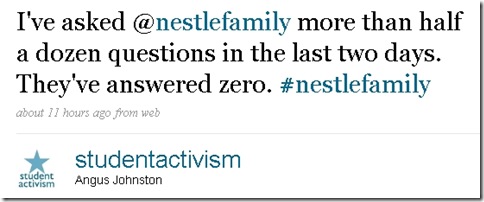Home » web2.0 (Page 9)
Category Archives: web2.0
A Day in the Internet
Some useful comparisons for teaching about teh Interwebs …

Created by OnlineEducation.net [Via Jill]
Google gets real-time, but is real actually good?
In yesterday’s massive Google product roll-out, the big drawcard was the release of real-time search into their standard search results. Real-time search initially includes Twitter tweets, but will soon include Facebook status updates (from public profiles) and MySpace statuses, too. As The Guardian quite rightly notes, the release of real-time search quashes talk about Twitter or Facebook becoming major challengers to Google’s search dominance:
Some critics have posited that websites like Facebook and Twitter could eventually rival Google, thanks to their ability to tap into millions of public messages being sent constantly between individuals. That threat comes in addition to more traditional search engines like Microsoft‘s Bing.com have threatened to forge exclusive deals with some content providers as a way to claw back market share. Instead, Google has acted to bring those services into the fold, though it would neither confirm nor deny whether there was a financial relationship behinds its links with social networking sites.
Indeed, in the New York Times, Twitter co-founder Biz Stone suggests that the relationship between Twitter and Google is an ideal partnership, with Google’s advanced search technologies making Twitter searching more meaningful to users:
Twitter makes a search tool available on its own site. But Biz Stone, a Twitter co-founder, said that Google would be better able to serve up Tweets that are relevant to a particular user’s questions. “Were not good at relevancy right now, and they are,” he said. “More people will get more value out of Twitter because we are doing this with Google.”
Real-time search will appear in a live-updating box at the top of relevant search results; here’s Google’s real-time search video to explain:
Real-time search is being rolled out across the globe in the coming days, but to see it in action now, head over to Google Trends and click on any of the popular searches; the results will include real-time search results.
Of course, it’s worth mentioning that just because social media statuses and tweets are being generated in ‘real-time’ it doesn’t necessarily make them worth reading. On any given topic, the speed with which Twitter fills up with spam tweets is pretty rapid, so this is a whole new spam arena, with the real prize being the top spots on Google’s most valuable real-estate: the main search pages. More to the point, while other results are ranked in various ways, real-time just means it’s happening now, which is no indication of quality whatsoever. Real-time is a whole new game in some ways, and it’ll be interesting to see what happens. Naturally, for people who still haven’t thought through their privacy in terms of Twitter or Facebook should really think about it now; do you want your status updates appearing at the top of Google’s search results? A question especially important when Google’s CEO is happy to state on the record: “If you have something that you don’t want anyone to know, maybe you shouldn’t be doing it in the first place.”
Oh, and in another Google product launch which got a lot less attention, Google’s mobile phone OS, android, now has a really promising image recognition app: Google Goggles; just take a picture and let Google Goggles figure out what it is, and take you to an appropriate reference! Goggles don’t do facial recognition, yet, but there’s a future worth thinking through, too!
What is Google Wave?
Still confused about what Google Wave can do, or is intended to do. So are most people; they should watch this.
(Or, if you really prefer your explanations more technical, there’s O’Reilly’s fairly technical An Introduction to Google Wave – Google Wave: Up and Running.)
VegeSmite? Some quick thoughts on #vegefail & #nestlefamily
Twitter hastags are quickly becoming the popular shorthand to express corporate disasters with social media. Two cases in point recently: #vegefail, the dramatic, vitriolic and 100% negative response to Kraft naming a new Vegemite and Cheese product ‘iSnack 2.0’ after opening to public suggestions, and #nestlefamily in which the many, many questionable practices for Nestle regarding infant formula, and other things, resurfaced as the company courted influential ‘mummybloggers’ (a shorthand which, I gather, should really be ‘parent bloggers’ since some dads blog in this fashion, too).
First, Kraft: while having a national competition to name the new Vegemite product actually seemed a great way to harness Aussie love for all things Vegemite, especially when you receive more than 50,000 suggestions, letting Kraft simply pick a winner from all those suggestions was not such a good plan, especially when they picked ‘iSnack 2.0’ (which might be a good name for Steve Jobs’ new toaster, but not for an Australia food icon). Since the announcement last Saturday, there has been complaints, loud, angry, and funny (see one person’s response Downfall meme style! and the satirical iSnack 2.0 Twitter stream) but at the same time, the love for Vegemite was the most thing most central in these responses. All the complaints may have looked like a massive marketing fail (hence #vegefail) yet Kraft have announced today (a mere 6 days later) that they’re going back to the drawing boards and getting another new name:
In the end, though, I tend to agree that the iSnack 2.0 reaction was far from a PR disaster – whether planned from the beginning, or a clever reaction to overwhelming customer sentiment, in going back to their consumers and letting them vote once again (albeit from six safe and crappy names) Kraft both reminded most Australians how much they care about Vegemite and got more publicity for a new product than you could possibly generate with a traditional advertising campaign. (And despite the cynicism, yes, I’ve voted.)
By contrast, the recent #nestlefamily controversy erupted when Nestle attempted to court influential ‘mummybloggers’ in the US by inviting 20 or so of them to a paid retreat where Nestle could show off their latest products and get authentic mummyblogger feedback. However, Nestle seemed to give no thought at all to what openly courting social media attention might actually mean. On hearing about the planned event, and noting that some of the attendees were people she respected, PhD in Parenting wrote a long post entitled ‘An open letter to the attendees of the Nestle Family blogger event’ which reminded a lot of people about the many issues with Nestle as a company, including their long history of unethical behaviour, especially in relation to infant products, most notably, of course, being pushing infant formula in Africa. Needless to say, before the event even started, a massive debate began on Twitter between supporters and detractors of Nestle; the oddest thing, though, was the deafening silence from Nestle. For most of the debate, they remained silent and let people rage on blogs and Twitter. In leaving others to defend Nestle, some of the most angry defenders have clearly done more harm than good. I don’t have time to go too far into the details, but I recommend reading the summary by Crunchy Domestic Goddess which gives an even-handed overview of the guts of the debate in terms of the way social media has been used.
Then, in a last ditch effort, Nestle have officially joined Twitter to try and manage the #nestlefamily debates, but they still don’t understand that this is a conversation, not a PR engine. At the end of the day, this tweet seems to sum up perfectly why Nestle just don’t get social media:
Of course, now that questions are being asked loudly, if Nestle doesn’t answer them, others will.
The difference between Nestle and Kraft is simple: at the end of the day, Kraft listened and that was their salvation. Nestle could learn from their corporate cousin.


